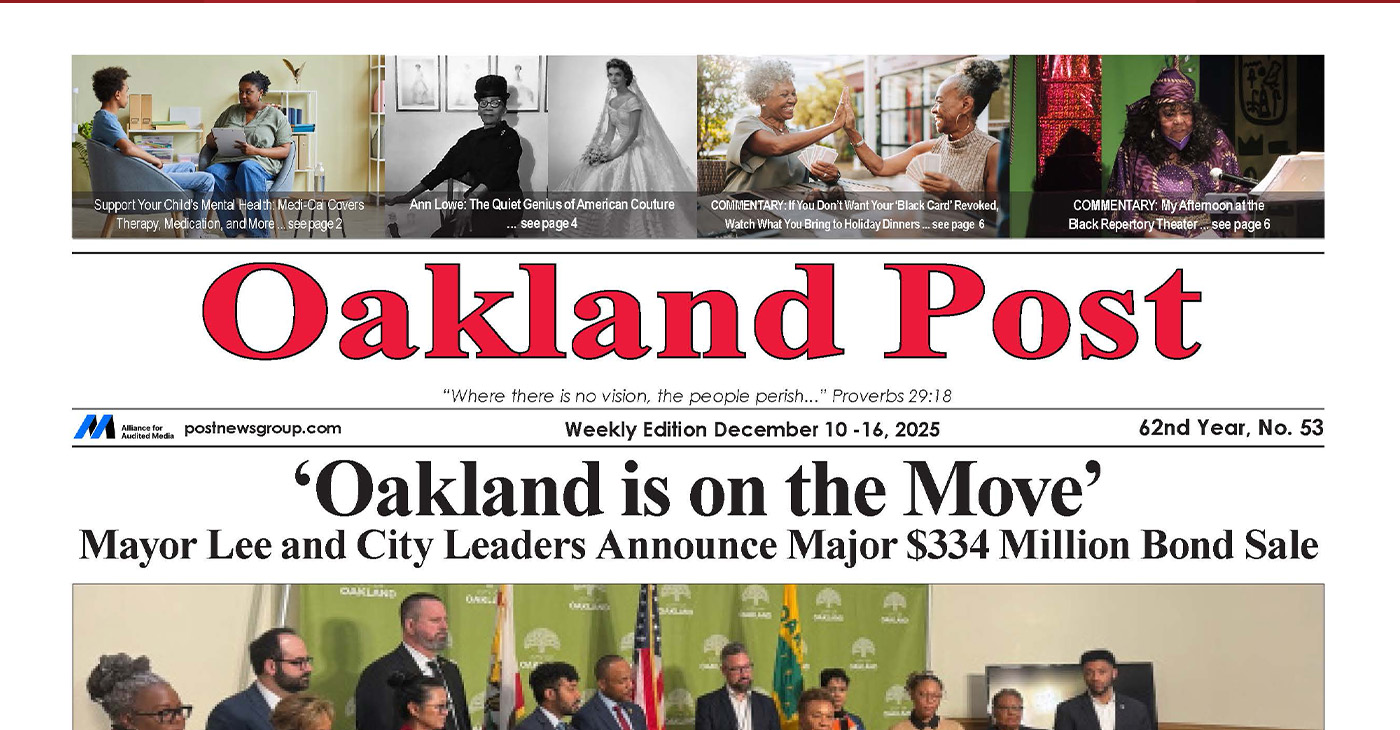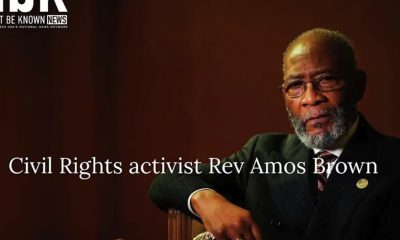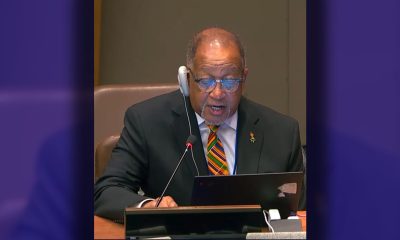National
Obama Urged to Appoint Reparations Commission
By Freddie Allen
Senior Washington Correspondent
WASHINGTON (NNPA) – In the wake of the mass murder of nine Black church members in Charleston, S.C. and the rash of unsolved fires at Black churches in the South, a coalition of Black groups are calling on President Barack Obama to issue an executive order to establish a “reparatory justice” commission.
“This is a moment in which you have to act and we believe that from Ferguson to Baltimore to Charleston and obviously before that there is an urgent need to ask why this keeps happening and to definitely have the kind of conversation and action to move the nation forward,” said Ron Daniels, the president of the Institute of the Black World 21st Century (IBW) and the convener of the National African-American Reparations Commission (NAARC), a group of Black leaders that represent educational, health, advocacy and faith-based organizations.
Daniels said that the uprising in Baltimore triggered by the murder of Freddie Gray exposed the deep-seated isolation and racial disparities that exist in that city and other urban centers across the nation that clearly illustrate the ongoing impact of White supremacy in this country.
“It’s not always people that are overtly hostile, sometimes people don’t see and understand the plight of Black people,” said Daniels.
White people look at things one way and Black people look at things a different way, said Daniels, adding that some White people simply don’t understand the implicit bias that President Barack Obama addressed during his eulogy for Rev. Clementa Pinckney, the pastor of Emanuel A.M.E Church who was one of nine people shot to death during a Bible study at the church on June 17.
“There needs to be an aggressive approach by this country which does not deny or hide, but confronts and addresses the issues [affecting Black people] and provides the appropriate level of action and initiative for reparatory justice for people of African descent,” said Rev. JoAnn Watson, a NAARC Commissioner and a former member of the Detroit City Council.
Watson said that the approach addressed in the request for a reparatory justice commission is long overdue, because many initiatives that have preceded the NAARC proposal have gone unfulfilled and unfinished.
Watson noted that Special Field Order Number 15, issued by General William T. Sherman in January of 1865 in an effort to secure 400,000 acres for freed slaves, was later rescinded by President Andrew Johnson following the assassination of President Abraham Lincoln. The Freedman’s Bureau, formerly called the U.S. Bureau of Refugees, Freedmen and Abandoned Lands, was created by Congress at the end of the Civil War to assist former slaves in the South in the aftermath of the war, was unceremoniously defunded and shuttered about seven years after the agency opened.
The commission seeks to address racial disparities in housing, public education and the criminal justice system through specific policy reforms and may also recommend additional funding for Black colleges and universities and a constitutional amendment to cement voters’ rights.
In a letter to President Obama, the group called White supremacy and racism deadly diseases infecting the social, economic and political fabric of the nation.
“As you have related Mr. President, despite progress since the era of enslavement, Jim Crow and de facto discrimination/segregation, the ‘badges and indicia’ of the longstanding exploitation and oppression of people of African descent are reflected in the devastating disparities in health, education, housing, employment, economic development, wealth and incarceration rates which harm large numbers of Black people each and every day in this land of enormous prosperity,” the letter said.
It continued, “Despite these realities, polls and studies indicate that a substantial number of White Americans fail to see or are in denial about the stubborn persistence of racism and its effects on Black people. In fact, there is a tendency to blame Blacks for the conditions our people find themselves in and/or to express ‘racial resentment’ of the perceived progress of Blacks, as being a function of encroaching on the success of Whites. Even among well meaning, sympathetic Whites, there is often a failure to recognize how implicit bias colors the countless decisions which constrain or kill the aspirations of Black people in this nation.”
Instead of becoming more optimistic about race relations after the election of the nation’s first Black president, a joint survey conducted by the Pew Research Center (PRC) and USA Today in August 2014 found that Black respondents have grown more pessimistic.
“Majorities of Blacks (64 percent) and Whites (75 percent) say the two races get along at least pretty well, though fewer blacks express this view than did so four years ago (76 percent),” a report on the survey said. “In 2007, 69 percent of Blacks said Blacks and Whites get along very well or pretty well.”
In the same poll Black and White respondents expressed contrasting views on the performance of local police departments.
“Fully 70 percent of Blacks say police departments around the country do a poor job in holding officers accountable for misconduct; an identical percentage says they do a poor job of treating racial and ethnic groups equally.],” the survey respondents reported. “And 57 percent of African Americans think police departments do a poor job of using the right amount of force.”
Just 27 percent of Whites said that police departments do a poor job holding officers accountable and 23 percent of Whites said that police forces do a poor job using the right amount of force.
Nearly two-thirds (62 percent) of White respondents said that police officers do a good or fair job treating racial and ethnic groups equally, but less than 30 percent of Blacks felt the same way.
In a statement, Kamm Howard, a leader of the National Coalition of Blacks for Reparations in America (NCOBRA) and a member of the NAARC, said that an executive order creating the commission will help to re-frame the national discussion of reparatory justice around the international standards of full repair.
“This includes halting many discriminatory practices, efforts aimed at restoring and making whole our peoplehood, a variety of compensatory polices, dignity enhancing projects, programs and policies as well as various modalities that initiate healing from post-traumatic slavery syndrome and its many manifestations,” said Howard.
Watson, the former Detroit City Council member, dismissed the idea that the sharp racial discrimination and animosity towards Blacks that sparked the Civil Rights Movement is a thing of the past.
“Black church burnings are occurring presently,” Watson said. “The Charleston, S.C. massacre was in our present. That was not a lone gunman.”
According to Watson, America has blood on its hands as a result of a subculture that has been allowed to ferment in the hands of the same people that continued to enslave Blacks for two and half years after President Abraham Lincoln issued the Emancipation Proclamation in 1863.
Instead of only turning to conversations about race during tragedies or sensational, ratings-driven stories in mainstream media, Daniels suggested that the commission could be the impetus for sustained, meaningful and fact-based conversations about race led by scholars, activists and community stakeholders in cities across the U.S. Now that the nation’s attention is focused on race relations, Daniels said that it’s time to systematically and seriously address “state of emergency in America’s dark ghettos.”
Watson agreed, adding that the commission should be established during President Obama’s final years in office.
Watson said: “This is the appropriate time, the right place and an absolute opportunity for this nation to step up and fulfill the promises that have been made and not kept.”
Activism
Oakland Post: Week of December 10 – 16, 2025
The printed Weekly Edition of the Oakland Post: Week of – December 10 – 16, 2025

To enlarge your view of this issue, use the slider, magnifying glass icon or full page icon in the lower right corner of the browser window.
Alameda County
Seth Curry Makes Impressive Debut with the Golden State Warriors
Seth looked comfortable in his new uniform, seamlessly fitting into the Warriors’ offensive and defensive system. He finished the night with an impressive 14 points, becoming one of the team’s top scorers for the game. Seth’s points came in a variety of ways – floaters, spot-up three-pointers, mid-range jumpers, and a handful of aggressive drives that kept the Oklahoma City Thunder defense on its heels.

By Y’Anad Burrell
Tuesday night was anything but ordinary for fans in San Francisco as Seth Curry made his highly anticipated debut as a new member of the Golden State Warriors. Seth didn’t disappoint, delivering a performance that not only showcased his scoring ability but also demonstrated his added value to the team.
At 35, the 12-year NBA veteran on Monday signed a contract to play with the Warriors for the rest of the season.
Seth looked comfortable in his new uniform, seamlessly fitting into the Warriors’ offensive and defensive system. He finished the night with an impressive 14 points, becoming one of the team’s top scorers for the game. Seth’s points came in a variety of ways – floaters, spot-up three-pointers, mid-range jumpers, and a handful of aggressive drives that kept the Oklahoma City Thunder defense on its heels.
One of the most memorable moments of the evening came before Seth even scored his first points. As he checked into the game, the Chase Center erupted into applause, with fans rising to their feet to give the newest Warrior a standing ovation.
The crowd’s reaction was a testament not only to Seth’s reputation as a sharpshooter but also to the excitement he brings to the Warriors. It was clear that fans quickly embraced Seth as one of their own, eager to see what he could bring to the team’s championship aspirations.
Warriors’ superstar Steph Curry – Seth’s brother – did not play due to an injury. One could only imagine what it would be like if the Curry brothers were on the court together. Magic in the making.
Seth’s debut proved to be a turning point for the Warriors. Not only did he contribute on the scoreboard, but he also brought a sense of confidence and composure to the floor.
While their loss last night, OKC 124 – GSW 112, Seth’s impact was a game-changer and there’s more yet to come. Beyond statistics, it was clear that Seth’s presence elevated the team’s performance, giving the Warriors a new force as they look to make a deep playoff run.
#NNPA BlackPress
LIHEAP Funds Released After Weeks of Delay as States and the District Rush to Protect Households from the Cold
BLACKPRESSUSA NEWSWIRE — The federal government has released $3.6 billion in home heating assistance after a delay that left states preparing for the start of winter without the program’s annual funding.

By Stacy M. Brown
Black Press USA Senior National Correspondent
The federal government has released $3.6 billion in home heating assistance after a delay that left states preparing for the start of winter without the program’s annual funding. The Low-Income Home Energy Assistance Program, known as LIHEAP, helps eligible households pay heating and cooling bills. The release follows a shutdown that stretched 43 days and pushed agencies across the country to warn families of possible disruptions.
State officials in Minnesota, Kansas, New York, and Pennsylvania had already issued alerts that the delay could slow the processing of applications or force families to wait until December for help. In Pennsylvania, more than 300,000 households depend on the program each year. Minnesota officials noted that older adults, young children, and people with disabilities face the highest risk as temperatures fall.
The delay also raised concerns among advocates who track household debt tied to rising utility costs. National Energy Assistance Directors Association Executive Director Mark Wolfe said the funds were “essential and long overdue” and added that high arrearages and increased energy prices have strained families seeking help.
Some states faced additional pressure when other services were affected by the shutdown. According to data reviewed by national energy advocates, roughly 68 percent of LIHEAP households also receive nutrition assistance, and the freeze in multiple programs increased the financial burden on low-income residents. Wolfe said families were placed in “an even more precarious situation than usual” as the shutdown stretched into November.
In Maryland, lawmakers urged the Trump administration to release funds after the state recorded its first cold-related death of the season. The Maryland Department of Health reported that a man in his 30s was found outdoors in Frederick County when temperatures dropped. Last winter, the state documented 75 cold-related deaths, the highest number in five years. Rep Kweisi Mfume joined more than 100 House members calling for immediate federal action and said LIHEAP “is not a luxury” for the 100,000 Maryland households that rely on it. He added that seniors and veterans would be placed at risk if the program remained stalled.
Maryland Gov. Wes Moore used $10.1 million in state funds to keep benefits moving, but noted that states cannot routinely replace federal dollars. His administration said families that rely on medical equipment requiring electricity are particularly vulnerable.
The District of Columbia has already mapped out its FY26 LIHEAP structure in documents filed with the federal government. The District’s plan shows that heating assistance, cooling assistance, weatherization, and year-round crisis assistance operate from October 1 through September 30. The District allocates 50 percent of its LIHEAP funds to heating assistance, 10 percent to cooling, 13 percent to year-round crisis assistance, 15 percent to weatherization, and 10 percent to administrative costs. Two percent is used for services that help residents reduce energy needs, including education on reading utility bills and identifying energy waste.
The District’s plan lists a minimum LIHEAP benefit of $200 and a maximum of $1,800 for both heating and cooling assistance. Crisis benefits are provided separately and may reach up to $500 when needed to resolve an emergency. The plan states that a household is considered in crisis if it has been disconnected from energy service, if heating oil is at 5 percent or less of capacity, or if the household has at least $200 owed after the regular benefit is applied.
The District’s filing notes that LIHEAP staff conduct outreach through community meetings, senior housing sites, Advisory Neighborhood Commissions, social media, posters, and mass mailings. The plan confirms that LIHEAP applicants can apply in person, by mail, by email, or through a mobile-friendly online application and that physically disabled residents may request in-home visits.
As agencies nationwide begin distributing the newly released funds, states continue working through large volumes of applications. Wolfe said LIHEAP administrators “have been notified that the award letters have gone out and the states can begin to draw down the funds.”
-

 Activism4 weeks ago
Activism4 weeks agoOakland Post: Week of November 12 – 18, 2025
-

 Activism3 weeks ago
Activism3 weeks agoIN MEMORIAM: William ‘Bill’ Patterson, 94
-

 Activism4 weeks ago
Activism4 weeks agoHow Charles R. Drew University Navigated More Than $20 Million in Fed Cuts – Still Prioritizing Students and Community Health
-

 Bay Area4 weeks ago
Bay Area4 weeks agoNo Justice in the Justice System
-

 #NNPA BlackPress3 weeks ago
#NNPA BlackPress3 weeks agoBeyoncé and Jay-Z make rare public appearance with Lewis Hamilton at Las Vegas Grand Prix
-

 #NNPA BlackPress3 weeks ago
#NNPA BlackPress3 weeks agoLewis Hamilton set to start LAST in Saturday Night’s Las Vegas Grand Prix
-

 Activism3 weeks ago
Activism3 weeks agoOakland Post: Week of November 19 – 25, 2025
-

 #NNPA BlackPress4 weeks ago
#NNPA BlackPress4 weeks agoThe Perfumed Hand of Hypocrisy: Trump Hosted Former Terror Suspect While America Condemns a Muslim Mayor




















































